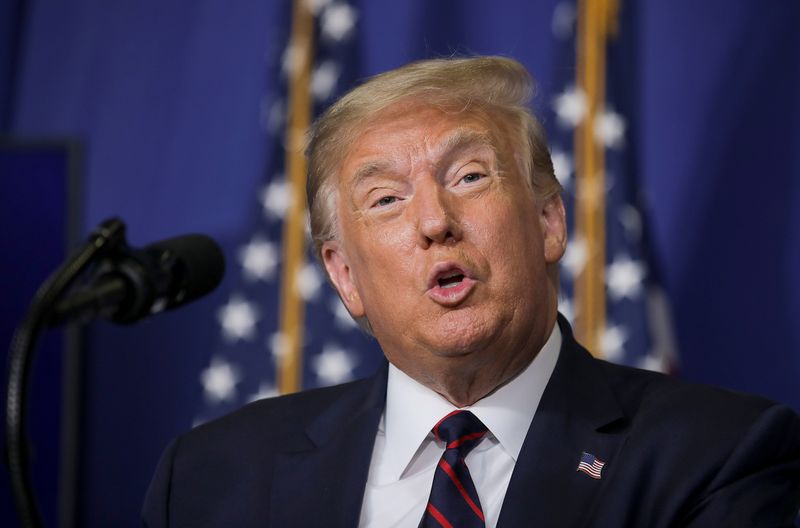By Ted Hesson
WASHINGTON (Reuters) - The administration of U.S. President Donald Trump took steps on Tuesday to limit deportation protections for 'Dreamers' who are living in the United States illegally after entering as children.
The move follows Trump's defeat last month in the Supreme Court, which found that his administration had violated federal law in its initial attempt to end the program.
In a memorandum, the Trump administration said it would block any new applications to the Deferred Action for Childhood Arrivals (DACA) program and allow only renewals that last one year, down from the current two-year period.
The move could spark another legal fight over Trump's hardline immigration agenda as he gears up for reelection on Nov. 3.
WHAT IS THE TRUMP ADMINISTRATION DOING WITH DACA?
In the memo on Tuesday, acting U.S. Department of Homeland Security Secretary Chad Wolf said he would limit the scope of the DACA program due to "serious concerns" about its legality and effects - including its potential to encourage illegal immigration - while the Trump administration reviews it.
In addition to blocking new DACA applications and imposing a one-year duration for renewals, the memo said that DACA recipients would only be granted permission to travel outside the country in "exceptional circumstances."
The memo comes after a federal judge in Maryland ordered the Trump administration on July 17 to fully restore the DACA program, a ruling that advocates say requires DHS to accept new applications.
WHAT HAPPENED AT THE SUPREME COURT?
Trump moved in 2017 to phase out the DACA program. His administration argued the initiative of his Democratic predecessor, Barack Obama, was unconstitutional and would not withstand legal challenges.
Several federal courts blocked Trump's attempt to terminate the DACA program. The case went to the Supreme Court, which ruled in June that the Trump's administration's actions were "arbitrary and capricious" and violated federal regulatory law.
The Supreme Court's 5-4 decision - with conservative Chief Justice John Roberts siding with the court's liberals - did not prohibit the Trump administration from again attempting to end the DACA program with proper legal procedures.
Trump signaled after the Supreme Court defeat that he would again attempt to terminate the DACA program.
WHAT IS THE DACA PROGRAM?
Obama announced DACA in 2012 after more than a decade of failed efforts to pass legislation in the U.S. Congress that would have provided a path to citizenship for so-called Dreamers.
The program offered unauthorized immigrants who came to the United States before age 16 the chance to obtain a work permit and a reprieve from imminent deportation.
Applicants were required to pass a criminal background check to ensure they had not been convicted of a felony or significant misdemeanor. They needed to have completed high school, still be in school or have served in the U.S. military.
The Obama administration said the program would allow immigration officers to focus on higher-priority offenders. Critics called it an abuse of executive power.
WHO IS ENROLLED IN DACA?
About 644,000 people are enrolled, according to the most recent government data. Nine out of 10 are immigrants born in Mexico, El Salvador, Guatemala and Honduras. More than half live in California, Texas, Illinois, New York and Florida.
The average age of DACA enrollees is 26, with slightly more women than men, according to the latest statistics.
A 2017 analysis of U.S. Census Bureau data by the Migration Policy Institute found the top occupations for immigrants in the program were food preparation and serving, sales, office and administrative support, and construction.
WHERE DO EMPLOYERS STAND?
Major U.S. companies support DACA and have hired work-eligible beneficiaries.
In an October 2019 brief in the Supreme Court case, 125 companies - including Amazon (NASDAQ:AMZN), Facebook (NASDAQ:FB), Google (NASDAQ:GOOGL) and Starbucks (NASDAQ:SBUX) - said ending the program would "inflict serious harm" on employers, workers and the U.S. economy. They were joined by 18 major business associations.
DACA enrollees hold thousands of jobs in the medical field, a point backers have raised during the coronavirus pandemic.

Plaintiffs defending the program noted in a Supreme Court brief earlier this year that 27,000 DACA recipients are healthcare workers, including nurses, pharmacists and home care aides. Nearly 200 are medical students, residents and physicians, the brief said.